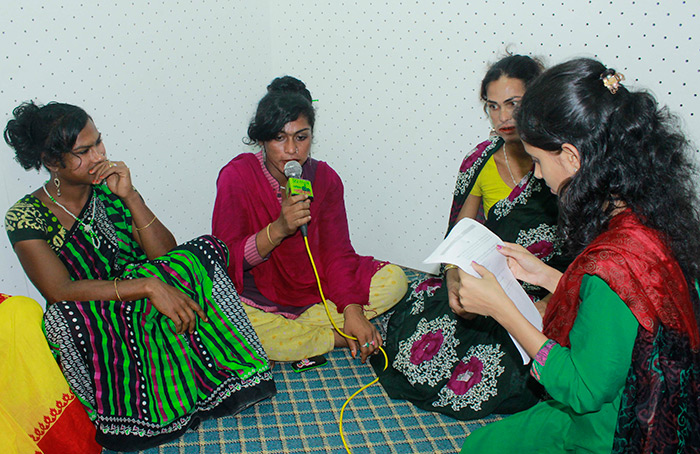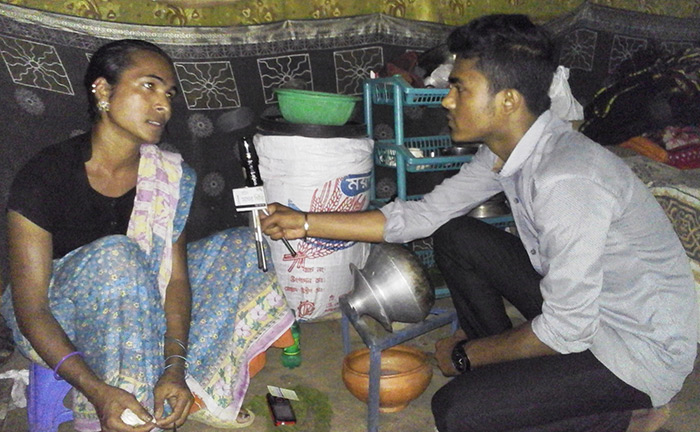Manush Manusher Janno (SDGs 10):
Empowering the Third Gender (Hijra’s) through Community Radio in Bangladesh



Supported by

Implemented by
Bangladesh NGOs Network for Radio and Communication (BNNRC) has been struggling for the last 18 years to open up the community media (including Community Radio, Community Television) and giving focus on its vital role as voices of the voiceless rural people.
Now 17 Community Radio Stations are on-air in the country, aiming to ensure empowerment and right to information for the rural community. They are broadcasting altogether 135 hours program per day on information, education, local entertainment and development motivation activities. Around 100 Youth Women & Youth are now working with those Stations throughout the country as rural broadcasters. Another 15 Community Radio will start broadcast by end of this year.
These programs are quite supportive to the activities reflected in 7th five-year plan of Government of Bangladesh, UN World Summit on the Information Society (UN WSIS) Action Plan, and UN Sustainable Development Goals (SDGs).
Empowering The Third Gender (Hijra’s) through Community Radio in Bangladesh program Initiated by Bangladesh NGOs Network for Radio and Communication (BNNRC) with the support from Bandhu Social Welfare Society (BSWS) this small program is based on a set of micro-narratives in line with rural Bangladesh through Community Broadcasting with the directly participation of The Third Gender (Hijra’s). Its aim is to draw an attention on the multidimensional aspects of poverty experienced by hijras and how traditional and binary understanding of gender itself manifest in extreme social exclusion. By 2030, the vision of the SDGs is to move towards a just, equitable, tolerant and socially inclusive world where the needs of the most vulnerable are met.
Community people of rural Bangladesh have yet to understand and recognise the multidimensional aspects of gender-identity discrimination and the physical and emotional effects of stereotypical perceptions experienced by hijras. While the third gender has been recognised by the Government, hijras continue to face extreme discrimination in the present moment and on a daily basis in every aspect of their lives. From accessing healthcare, education, safe living spaces, public transport and other services, they severely lack opportunities to earn a decent livelihood, and ultimately are denied their basic human rights for a life of respect and dignity. At present, there are 10,000 hijras living in Bangladesh.
Empowering The Third Gender (Hijra’s) through Community Radio in Bangladesh is contributing that the future can be made more promising through the community radio program, so far as government, hijra communities, development sector, private sector, NGOs, academia, community people – together put in concerted efforts for the inclusion of hijras in the daily community life in rural Bangladesh. Most importantly, the voices of the hijra community – their ideas, aspirations and solutions – must be at the heard of this process.
The implication of the SDGs especially SDG 10 in this context is yet to be defined in order to combat the factors causing the hijra community’s extreme social exclusion. For a start, the identification of the various barriers – economic, cultural, environmental, political and social – they face must be recognised. This recognition must go hand in hand with appropriate and targeted public provisions for hijras living in rural Bangladesh in line with community/ family based rehabilitation rather then ignored.
Implemented by:
Bangladesh NGOs Network for Radio and Communication (BNNRC). Through 15 Community Radio Stations like Radio Community Padma, Community Radio Nalta, Community Radio Lokobetar, Community Radio Pollikontho, Community Radio Sagar Giri, Community Radio Mahananda, Community Radio Mukti, Commuity Radio Chilmari, Community Radio Jhenuk, Community Radio Sundarban, Community Radio Naf, Community Radio Bikrampur, Community Borendro Radio, Community Radio Sagardwip, Community Radio Sarabela.
Project duration: February 2017
Budget: 3,44,600 Bdt
Background:
Hijras are socially excluded, living on the fringes of society, harassed by the police and abused by the public. Though most of them are involved in singing and dancing at weddings or child birth as a part of their traditional Badhai culture but few of them are in begging and sex trade. Violence against hijra, especially hijra sex workers, is often brutal, and occurs in public spaces, police stations, prisons, and their homes. They face extreme discrimination in health, housing, education, employment, immigration, law, and any bureaucracy that is unable to place them into male or female gender categories.
A landmark decision has already been made by the government of Bangladesh acknowledging the Hijra as third gender in 11th November 2013, This recognition will secure their rights, enabling them to identify their gender as ‘hijra’ in all government documents, including passports apart from allowing them to identify their gender as ‘hijra’ when personal information needs to be furnished. After a year of the government announcement, the third gender community is still waiting for a specific law to be enacted to cover their rights.
Program contents:
Recognition as Individuals: Acknowledged through constitution, Introduce National ID as Third Gender, Ensure Voter ID for all hijra community, Reserve quota for Hijra in the national parliament, Introduce third box in all official forms,
Ensure of health services:
Free treatment facility in all Govt. Hospitals and private hospital, Initiatives to reduce harassment to get access from Govt. Hospitals/private hospital, Introduce Special care program for Mental support of Hijra.
Rehabilitation program:
Allocate Govt. land for hijra community prioritize elderly hijra, Initiatives to build division wise individual neighborhood for hijra community, Inheritance property and legal support, Specific laws and policies to ensure hijra rights, Include hijra in Inheritance laws, Develop Anti Discriminatory law to protect the rights of hijra community and other minority population, Effective measures to enact the laws beside the formulation of different policies
Education Program:
Establish discrimination free educational system to ensure basic rights, Introduce hijra culture in National Curriculum in primary and secondary level with proper information and realistic data, Introduce Hijra studies in different academy like other studies i.e Sociology, Anthropology, Social Welfare, Journalism, Public Administration, Political science, Initiatives to introduce formal, informal and technical educations for all hijra, Create opportunity for hijra for higher studies in Bangladesh Open University.
Role of Mass Media:
Increase the numbers of programs focusing and involving hijra community in the media and start campaign to stop presenting negative image of hijra in the mass media, produce documentary, film and investigating article on Hijra Issue,
Employment opportunity:
Create employment opportunity and arrange training on Technical Skills (TVET), Explore new and creative opportunity for hijra community and effective strategies to involve in the program and better livelihood, Introduce Quota system to bring equality, Create quota system to enroll hijra in Educational institutes, Initiate quota for hijra in Govt. services, Reserve seats for hijra in Public Transport,
Awareness and Advocacy programs:
Continuous program on mass awareness, Launch special programs with family members of the hijra that will help to them to treat their Children as like as others, Sensitize the guru of hijra about the culture, norms and values of the society that will help the society to change their views towards hijra community, Create opportunity by the Government, Private sector and NGO to create better livelihood options, Arrange more awareness program on Gender Diversity, Support those CBOs/NGOs who are constantly working on capacity building programs for hijra community.
Others: Need to arrange social mapping and hijra census for appropriate and effective initiatives, Secure Safety Net program in all districts and upazillas level of Bangladesh, To create positive image, more involvement of Hijra is required with the Ministry of Social Welfare, Need to ensure them in National Social Protection Strategy (NSPS), Increase the budget for livelihood program under the Ministry of Social Welfare, Ensure the Funeral performance after death as a part of rituals, Initiatives to Protect the thousands years of hijra culture
Goal: To sensitized among the stakeholders regarding human rights of gender diver’s population.
Objectives:
- To increase awareness and knowledge among the gender diverse populations about their human rights
- To improve the environment for the gender diverse population with access to public services through sensitizing policy makers & stakeholders
- To enhance the capacity of relevant stakeholders to reduce harassment, stigma, discrimination and human rights violations based on sexual orientation and gender identity
- To increase the empowerment of the gender diverse population through capacity building by addressing their human rights issues.
Type of Radio Program:
- Magazine Program: Involved CR Stations are: Community Radio Pollikontho, Community Radio Sagar Giri and Community Radio Bikrampur.
- Public Service announcement (PSA): Mentioned 15 Community Radio Stations
Supported by: Bandhu Social Welfare Society (BSWS)
Contact-
Mr. Kamaruzzaman
Project Coordinator, BNNRC
Tel: 88 02 9130750, 9138501, 9101479
